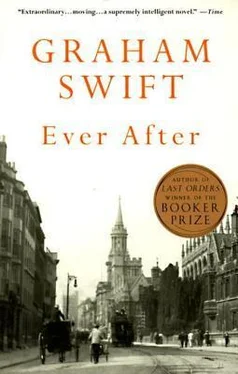But there is no reason to suppose that on this summer’s morning he feels himself to belong to a vanishing age. Or that he looks upon the coach and team that will transport him westwards with the sort of wistful feeling that one day, indeed, people will apply to steam engines.
I see him (I have no proof of this; I have no idea what he looked like at all) as one of those robustly sober-looking young men in whom youth puts in only a tenuous appearance. He has the solid build and steady movements of a precocious maturity. He is unostentatiously dressed, for an Oxford man, and as he stands in the bustle of the inn-yard at this unseemly hour of the morning, he shows no sign either of aloofness or of discomfort. There is even a hint that he feels at home amidst such workaday surroundings and that he is not entirely sorry to be leaving this cloistered and rarefied city.
The arm that swings his portmanteau is strong and sure. The eyes of women, more easily turned by any number of sprightly young bucks, might, having first passed over Matthew, return to him with a sense of revised judgement. The face cracks readily enough into a generous smile or to offer some casual pleasantry — he has an appealing way of hovering between thoughtfulness and affability. The gaze is open and frank and meets yours forthrightly. You would say it was an observant gaze.
The very last quality he emanates — he climbs up, naturally, to take his seat on top behind the coachman — is lack of balance. Stability, rather, an intuitive sense that all things must have their basis, might be called his tacit watchword. He will become a surveyor. That is an unambitious, even lowly profession for a man with an Oxford education. But Matthew is shrewd enough not to leap ahead of his talents — three years at Oxford have taught him that he is neither an idler nor a genius — and both Matthew and Matthew’s father (though perhaps Matthew’s father rather more) are shrewd enough to foresee that there will be much call in the years ahead for versatile surveyors, and that a surveyor with the asset of an Oxford education might go far, even given the limited spheres in which surveyors operate.
And look at it another way. It is true that in the coming years, great engineers and designers would win for themselves immortal fame — it would be Matthew’s lot to know at least one of them (and feel a touch of pity mixed with his admiration) — but no surveyors. Yet what, in essence, was the surveyor’s task? It was to establish the true ground of things; to provide a basis , a sure foundation on which the works of others might be raised. Was it not, literally, fundamental? It was as essential as it was unspectacular. It had nothing to do with risk and hazard; everything to do with stability and trust.
And trust, merging imperceptibly with the deeper stuff of faith, might have been the other, silent watchword of this dependable-looking young man. In his portmanteau is his mother’s Bible. Matthew would have referred to it often in private and been able to quote large parts of it by heart. And now, in 1840, after three years’ exposure to scholarly scepticism and the rigours of science, he would not have relinquished the belief that every word it contained was the literal and immutable truth. The world, too, must have its basis, and the nature of this basis had been indelibly intimated to him long ago on his mother’s knee. The central fact of life was there. It was a wondrous thing, this central fact, a wonderful clarifier, encourager and liberator. It meant that the profounder questions of existence were settled and one was free to go out on to the surface of the world and do good, practical work. And the surface of the world only brought you back to the central fact: nature’s handiwork, and man’s too, since it exploited the unchanging laws that were part of nature’s design, was evidence of God’s.
The coachman cracks his whip. They leave the city. The sun fills the green bowl of the world.
A further reason Matthew might have given for choosing a career unlikely to be meteoric or all-consuming was simply that it allowed time for other things. If Oxford had shown him he was no scholar, he recognised in himself a naturally inquisitive mind. He liked to be out and about, to get the touch and tang of things (he looked forward to this stage-coach journey which others would have regarded as a three-day purgatory), to look, take note, assess, compare — all admirable habits for a surveyor. In this sense, Oxford had constrained him (the truth was, perhaps, that he had shielded his mind from some of Oxford’s more unsettling influences). He thought of his interests as being ranging and extra-curricular: natural history, geology, the ever-absorbing study of his fellow men.
Geology, of course, bore directly on his chosen profession. But Matthew had not yet begun to sound (it would come, before that holiday in Lyme) those intimate links between geology and palaeontology which were not essential to a surveyor’s broad understanding of rock and soil, that mysterious paradox by which this study of dead stones offered the clue to Life itself.
Geology drew him, in the first place, precisely because it was the science of solidity, the very key to that thing on which all human endeavours began and must surely come to rest. Ask Matthew, aged twenty-one, what he most loved about the world, and he might well have said: land. He couldn’t have said where the passion came from — from the rolling prospects from his native Launceston — but it is there. Matthew loved land as a surveyor and a believer in God should. “And the little hills rejoice on every side …” His palm sometimes tingled — he wouldn’t have known how to explain it — to reach out and stroke the contours of a particular landscape, as one might stroke the flanks of a horse or the head of a child.
And he will have plenty of cause to feel such an itch, plenty of opportunity for geological reflection, as his coach carries him across the broad belly and down the crooked limb of England, over limestone and sandstone and peat and clay, through an old, old world.
Yes, he is glad to be free of this dreamy city with its fogs of ideas (I know the feeling). Out among real things. He has a handicap, a blemish, which he has endured and tried vainly to eradicate for three years: his accent. It is a Cornish accent, an east Cornish accent, but to most Oxford folk it is a yokel’s burr. From time to time it has miserably betrayed him by substituting a “bain’t” for an “isn’t.” But now, as he travels ever south-westwards, he relishes the release of allowing it progressively to return. He even prankishly indulges it (let’s suppose) before some enforced travelling companion, some dapper fellow -baccalaureus (let’s imagine) going as far as Bath, for whom “land” only has a meaning when it is translated into “income.”
Matthew’s father married Matthew’s mother in 1817. It seems to have been a union which demanded compromises, since the former was of the Methodist persuasion, while the latter was of staunchly Anglican stock. But John Pearce, like many of his kind, perhaps, when improved prospects presented themselves, was prepared to remodel his faith so far as to exchange chapel for church. His marriage, in short — since Susan’s father, once certain conditions were met, was not ill-disposed — was the means of his setting himself up in trade.
From his father Matthew would have inherited the conscientiousness, the self-reliance and that same will to self-improvement which stemmed from his submerged Methodist heritage. But from his mother he would have inherited his simple, sanguine faith. Susan Pearce was perhaps not exceptionally God-fearing: she merely accepted absolutely the traditions in which she had been raised and took parenthood responsibly enough to become in Matthew’s earliest years his moral instructor. The instruction apparently consisted almost entirely of direct readings from the Bible, with her comments and interpretations, though she seems to have been not averse to the occasional digression and to telling tales, as Matthew would later describe them, “of the old days.”
Читать дальше












